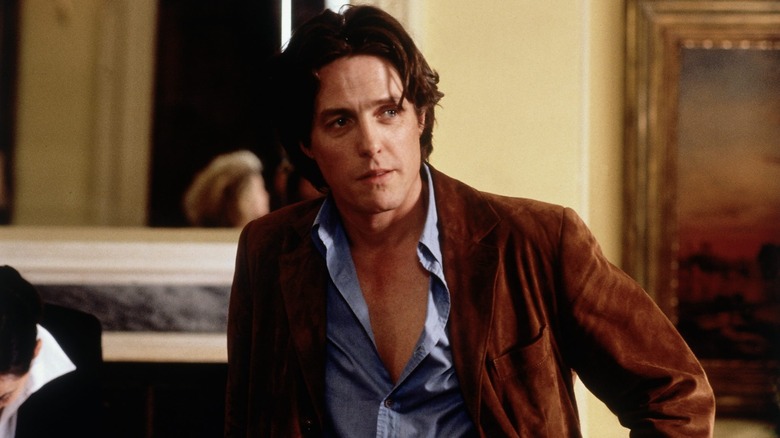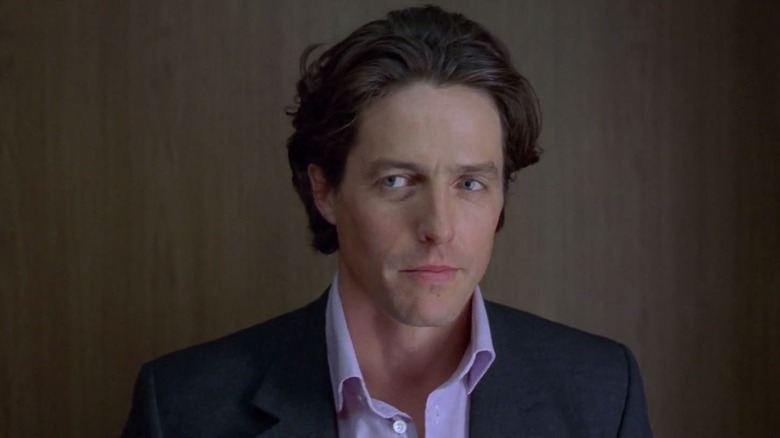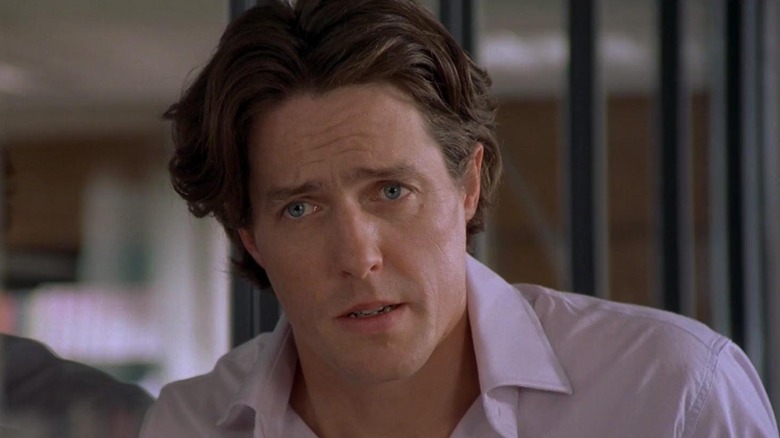All It Took Was Richard Curtis To Get Hugh Grant On Board With Bridget Jones's Diary
If you're a fan of '90s rom-coms, then you probably love the unforgettable films written by Richard Curtis starring the irresistibly charming Hugh Grant. My personal favorite among them is "Bridget Jones's Diary," a modern adaptation of "Pride and Prejudice" that centers around the indulgent and imperfect Bridget Jones caught in a classic love triangle. Believe it or not, Grant almost turned the film down. Luckily, he was convinced to join the cast when Richard Curtis stepped in to give the script his magic touch.
Curtis and Grant had a longstanding creative relationship. The actor was featured as the kind, soft-spoken romantic lead in three well-known films penned by Curtis, including "Four Weddings and a Funeral," "Notting Hill," and "Love Actually." "What Richard [Curtis] wrote was — whether intentional or not — a short franchise," said Mike Newell, the director behind "Four Weddings" (via Guardian). "Three movies in which Hugh's character doesn't really change."
Grant was a fan of the novel "Bridget Jones's Diary," written by Helen Fielding, which sparked his interest in the film adaptation. "I loved the book ... because half my friends are like that," he explained to Cinema.com. Despite being a fan of Fielding's work, Grant had some concerns about playing Bridget's boss Daniel, a.k.a. Mr. Wrong. It was a very different character from the ones he had been playing, but director Sharon Maguire was convinced that it was well within his range.
"When I talked to Hugh about the character, he said, hilariously, 'I just don't recognize this character, who is he?'" Maguire recalled, per E! News. "And I said, 'Oh, come on, you know this character.'" Still, the actor wasn't totally convinced. There was one more thing he needed to officially join the cast — the pen of Richard Curtis.
Script needs work, suggest Curtis write script
When Hugh Grant was first offered the part of Daniel Cleaver in "Bridget Jones's Diary," he felt like the screenplay wasn't totally up to snuff. "I didn't feel they had the script quite right for a long time," he explained to Cinema.com:
"And I kept saying, 'It's not working, just get Richard Curtis to come in and help rewrite it.' Eventually, they did, and as soon as Richard came on board, I signed on the dotted line. So that's all it was."
On top of being incredibly successful, Curtis had another personal connection with the project, so his involvement wasn't totally farfetched. Curtis was also a lifelong friend and ex-partner of Fielding's. "We did go out together — and he has been my best friend ever since," the author confessed to Vogue.
Once Richard Curtis signed on to "Bridget Jones," it was full steam ahead for Grant. Daniel marked a totally new direction for the actor but, rather than being afraid of this drastic pivot, Grant totally embraced it. "I mean, I'm sick to death of Mister Nice Guy, I've done way too much of it recently," he admitted to Cinema.com. "And I think it has made the rest of the world start to vomit slightly as well. So, 'Bridget Jones' was a really blessed relief."
Grant wanted to play the villain for a change
Daniel Cleaver is the antagonist of "Bridget Jones's Diary," but Hugh Grant still found a way to sympathize with him. "I don't know that he's evil. I think he just had it too easy, that was always my theory about Daniel," Grant explained to Cinema.com. "And now, the honeymoon is starting to get a little sour. .. but I don't feel Daniel is that shallow. I always thought he was quite deep, and really cared about literature, for instance."
The actor quickly realized that he and his character shared a wry wit. "I did of course worry that Colin [Firth] would win the film because his character wins her, but I comforted myself with the fact that I thought my character had more juicy lines," the actor joked, per E! News. "I counted them."
His character's comedic side came easily to Grant, but Daniel may have had a more emotionally complex side that the actor was unable to access. "I related to him," he told Sirius XM. "He's a disappointed man. He's in publishing and he always wanted to write his own book and hasn't. There was all that going on," Grant said, perhaps reflecting on a private desire that he once had to direct or write his own film. "I think I created an absolutely fascinating backstory to him, none of which comes through in the final performance."
Grant might not have gone as deep as he wanted to with the role, but he still knocks it out of the park. The creative symbiosis between Curtis and Grant changed rom-coms as we know it. "Bridget Jones's Diary" was proof that the actor and writer could break their formula and still pull out a hit.


